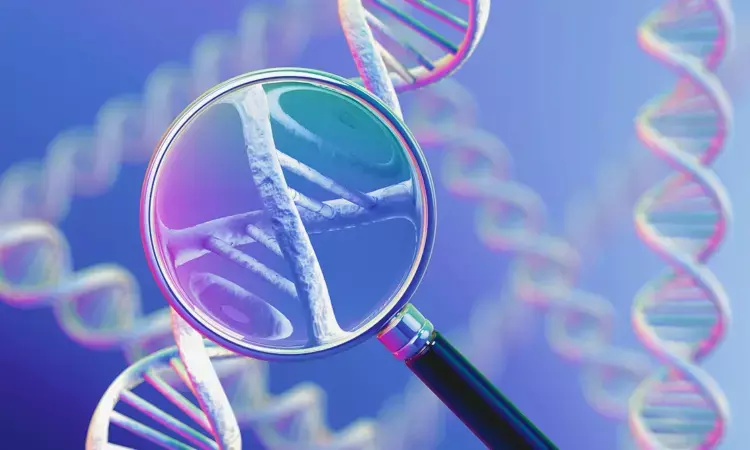- Home
- Medical news & Guidelines
- Anesthesiology
- Cardiology and CTVS
- Critical Care
- Dentistry
- Dermatology
- Diabetes and Endocrinology
- ENT
- Gastroenterology
- Medicine
- Nephrology
- Neurology
- Obstretics-Gynaecology
- Oncology
- Ophthalmology
- Orthopaedics
- Pediatrics-Neonatology
- Psychiatry
- Pulmonology
- Radiology
- Surgery
- Urology
- Laboratory Medicine
- Diet
- Nursing
- Paramedical
- Physiotherapy
- Health news
- Fact Check
- Bone Health Fact Check
- Brain Health Fact Check
- Cancer Related Fact Check
- Child Care Fact Check
- Dental and oral health fact check
- Diabetes and metabolic health fact check
- Diet and Nutrition Fact Check
- Eye and ENT Care Fact Check
- Fitness fact check
- Gut health fact check
- Heart health fact check
- Kidney health fact check
- Medical education fact check
- Men's health fact check
- Respiratory fact check
- Skin and hair care fact check
- Vaccine and Immunization fact check
- Women's health fact check
- AYUSH
- State News
- Andaman and Nicobar Islands
- Andhra Pradesh
- Arunachal Pradesh
- Assam
- Bihar
- Chandigarh
- Chattisgarh
- Dadra and Nagar Haveli
- Daman and Diu
- Delhi
- Goa
- Gujarat
- Haryana
- Himachal Pradesh
- Jammu & Kashmir
- Jharkhand
- Karnataka
- Kerala
- Ladakh
- Lakshadweep
- Madhya Pradesh
- Maharashtra
- Manipur
- Meghalaya
- Mizoram
- Nagaland
- Odisha
- Puducherry
- Punjab
- Rajasthan
- Sikkim
- Tamil Nadu
- Telangana
- Tripura
- Uttar Pradesh
- Uttrakhand
- West Bengal
- Medical Education
- Industry
CDSCO Eases Rules for Biopharma Research, Will Accept Lab Biosafety Committee Approvals

New Delhi: With the aim of streamlining the regulatory process for biopharmaceutical manufacturers engaged in vaccine, recombinant DNA, and other biological product development, the Central Drugs Standard Control Organization (CDSCO) has issued a circular announcing that approvals granted by Institutional Biosafety Committees (IBSC) will now be accepted for seeking permission to manufacture test items for examination, testing, and analysis through Form CT-10, in cases where the test item is generated using Category I and Category II GE Experiments as defined in the Regulations and Guidelines for Recombinant DNA Research and Biocontainment, 2017.
Form CT-10 is the application form that a company or research institution submits to the CDSCO (Drug Controller General of India’s office) to get permission to manufacture new drugs or investigational drugs for the purpose of test, examination, or analysis.
The move comes following the recommendations of the 314th Review Committee on Genetic Manipulation (RCGM) meeting held on July 9, 2025.
According to the Regulations and Guidelines for Recombinant DNA Research and Biocontainment, 2017 (refer to page nos. 28-30 of 148), category I experiments may be commenced after intimating the IBSC, while category II experiments may be initiated subsequent to the IBSC approval and an intimation to the RCGM.
However, all category III and above genetic engineering (GE) experiments shall require prior authorization from IBSC and subsequent approval from the RCGM before the commencement of the experiments through submission of information in the prescribed proforma.
Given the same, Category I and Category II GE experiments in the laboratory do not require RCGM approval and the regulatory pathways as defined in the Regulations and Guidelines for Recombinant DNA Research and Biocontainment, 2017, are to be followed.
There are different categories of genetic engineering (GE) experiments under the 2017 Recombinant DNA Research and Biocontainment Guidelines:
- Category I: Very basic/low-risk experiments (need only IBSC intimation).
- Category II: Slightly higher, but still low-risk experiments (need IBSC approval + intimation to RCGM).
- Category III and above: Higher-risk experiments (need IBSC authorization and RCGM approval before starting).
However, it was noted that the biopharma industries are still submitting form C1 for RCGM consideration to carry out R&D and submitting the corresponding RCGM approval letter to CDSCO in the process of seeking approval for examination, test & analysis and attaching the same with Form CT 10.
To simplify the process, the RCGM has requested,
"Therefore, it is requested to accept IBSC approval from Biopharma industries for submission of form CT 10 seeking permission for manufacturing of test items for examination, test and analysis in cases where the test item is generated using Category I and Category II GE Experiments as defined in the Regulations and Guidelines for Recombinant DNA Research and Biocontainment, 2017."
To view the official notice, click the link below:
Mpharm (Pharmacology)
Susmita Roy, B pharm, M pharm Pharmacology, graduated from Gurunanak Institute of Pharmaceutical Science and Technology with a bachelor's degree in Pharmacy. She is currently working as an assistant professor at Haldia Institute of Pharmacy in West Bengal. She has been part of Medical Dialogues since March 2021.


